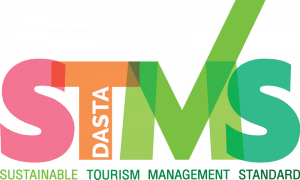Thailand’s Sustainable Tourism Management Standard is now a GSTC-Recognized Standard
May 2018 – The Global Sustainable Tourism Council (GSTC) is pleased to announce that Thailand’s Sustainable Tourism Management Standard, published by Designated Areas for Sustainable Tourism Administration (DASTA), has achieved the ‘GSTC-Recognized Standard’ status.
DASTA’s Thailand’s Sustainable Tourism Management Standard has been created for managing tourism and aims at helping all types and sizes of tourism-related organizations to manage tourism systematically and sustainably. It is expected to enable those related organizations to achieve a performance that is higher than the basic level required by law. These standards, therefore, can be challenging for organizations that want to improve the efficiency of their operation, leading to ’Sustainable Tourism.’
Achieving the GSTC-Recognized status means that a sustainable tourism standard has been reviewed by GSTC technical experts and the GSTC Accreditation Panel and deemed equivalent to the GSTC Criteria for sustainable tourism. Additionally, an organization that meets GSTC requirements must administer the standard. GSTC Recognition does not ensure that the certification process is reliable, only that the set of standards used to certify includes the minimum elements to ensure sustainability. The purpose of the GSTC programs is to reward genuine practitioners of sustainable tourism, which in turn builds confidence and credibility with consumers.
“By gaining GSTC-Recognized status for Thailand’s Sustainable Tourism Management Standard for Destinations, another step has been achieved in harmonizing national sustainability standards, set by DASTA, with global sustainability standards, set by GSTC,” Says Randy Durband, GSTC CEO. “This harmonization provides clarity for the management and market-facing communication of the application of these standards. That message includes the inclusion of the four pillars of sustainability: sustainable management, social/community, cultural, and environmental issues.”
«DASTA developed and has used Thailand’s Sustainable Tourism Management Standard for training and verified tourism-related organizations for years. Now it became the first tourism-related standard in Thailand that has GSTC-Recognized status. However, it is not an achievement, but only another milestone proving that our work is accurate in accordance with the international standard», says Dr. Nalikatibhag Sangsnit, Director-General of DASTA. «We know that there is still room for improvement and DASTA will continuously perform even harder to achieve GSTC-Accredited status eventually,» adds Dr. Sangsnit.
To date, 10 destination standards, and 30 hotels and tour operators standards have achieved GSTC-Recognized status. The completion of these step-wise programs rewards standard owners for their commitment to sustainability while offering the market a proof that these standards adhere to international norms.
The GSTC will continue to work with organizations around the world to provide GSTC Recognition of standards for sustainability in travel and tourism. GSTC Recognition does not ensure that a certification process is reliable, only that the set of standards used to certify are equivalent to the GSTC Criteria.
GSTC-Recognized standard owners are encouraged to complete the Accreditation process which relates to the quality and neutrality of their certification process. Achieving a GSTC-Accredited status affirms that their certification process follows the highest international standards while further distinguishing their standards and processes amongst other certification programs. Learn more about GSTC Accreditation.
About the GSTC
The Global Sustainable Tourism Council (GSTC) establishes and manages global sustainable tourism standards with the aim of increasing sustainable tourism knowledge and practices among public and private stakeholders. The GSTC is an independent and neutral USA-registered 501(c)3 non-profit organization that establishes and manages global baseline standards for sustainability in travel and tourism. The standards are two sets of GSTC Criteria: Destination Criteria and Industry Criteria, the minimum requirements for tourism businesses and destinations to pursue in order to protect and sustain the world’s natural and cultural resources, along with conservation and poverty alleviation. The GSTC represents a diverse and global membership, including UN agencies, leading travel companies, hotels, country tourism boards, tour operators, individuals and communities – all strive to achieve best practices in sustainable tourism.
Media Contact: communications@gstcouncil.org
About DASTA (Designated Areas for Sustainable Tourism Administration)
The Designated Areas for Sustainable Tourism Administration (DASTA) is a public organization based on the government’s tourism development policy of increasing revenue and distributing income to local communities by managing and developing areas for integrated tourism. Established in 2003, DASTA has performed as a central agency in setting policies and strategic plans while supporting and collaborating with local communities and attractions in developing potential areas to manage tourism quality and bring together human resources, budgets and equipments to manage tourism. It uses an integrated approach to solve problems quickly as well as encourages local communities to apply new management knowledge in order to achieve their goals.
The Office of Tourism Competitiveness under DASTA is responsible for ensuring competitiveness of the designated areas for sustainable tourism through assessing carrying capacity of tourist destinations; promoting and supporting tourism innovation; creating information on tourist attractions; and setting standards for sustainable tourism in order to increase the competitiveness in tourism. It has established its ‘Sustainable Tourism Management Standard’ by reviewing related international standards such as ISO 9001, ISO 14001, ISO 20121, ISO 26000, Global Sustainable Tourism Criteria (GSTC), the Responsible Tourism Requirement (South Africa) and by gathering information from related documents such as the National Economic and Social Development Plan. This Standard covers requirements in three dimensions: economic, socio-cultural, and environmental including health, safety, quality and aesthetic issues.





